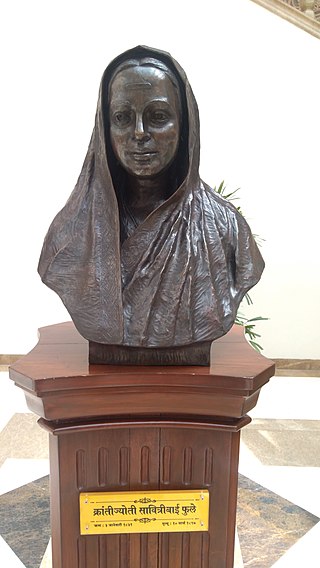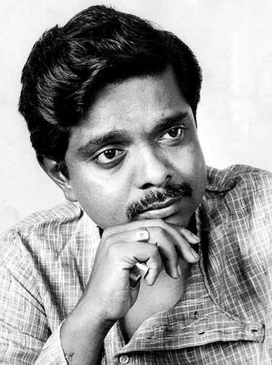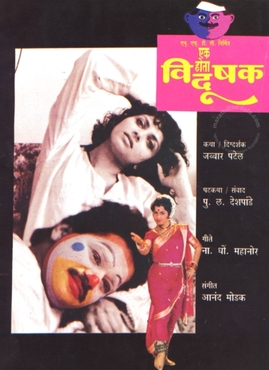Related Research Articles

Jyotirao Govindrao Phule was an Indian social activist, businessman, anti-caste social reformer and writer from Maharashtra. His work extended to many fields, including eradication of untouchability and the caste system and for his efforts in educating women and oppressed caste people. He and his wife, Savitribai Phule, were pioneers of women's education in India. Phule started his first school for girls in 1848 in Pune at Tatyasaheb Bhide's residence or Bhidewada. He, along with his followers, formed the Satyashodhak Samaj to attain equal rights for people from lower castes. People from all religions and castes could become a part of this association which worked for the upliftment of the oppressed classes. Phule is regarded as an important figure in the social reform movement in Maharashtra.The honorific Mahātmā, was first applied to him in 1888 at a special program honoring him in Mumbai.

Prahlad Keshav Atre, popularly known as Āchārya Atre, was a prominent Marathi writer, poet, educationist, founder–editor of Maratha, and above all a noted orator.

Savitribai Phule was one of the first female teachers in India, a social reformer, and poet. Along with her husband, Jyotiba Phule in Maharashtra, she played a vital role in improving women's rights in India. She is considered to be the pioneer of India's feminist movement. She strived to abolish discrimination and unfair treatment of people based on caste and gender. She and her husband were pioneers of women's education in India. They started their first school for girls in 1848 in Pune at Tatyasaheb Bhide's residence or Bhidewada.
The National Film Award for Best Feature Film in Marathi is one of the National Film Awards presented annually by the Directorate of Film Festivals, the organisation set up by Ministry of Information and Broadcasting, India. It is one of several awards presented for feature films and awarded with Rajat Kamal.
Hamid Umar Dalwai was an Indian journalist, social reformer, thinker, activist, author, writer and the founder of Muslim Satyashodhak Mandal and Indian Secular Society. Despite being an atheist, he attempted and advocated for several modernistic and liberal reforms within the Indian Muslim community, most notably being his futile agitation against the practice of triple talaq and polygyny during the 1960s. He has also authored several books, including Muslim Politics in Secular India (1968).

Sadashiv Dattaray Amrapurkar was an Indian actor, best known for his performances in Marathi and Hindi films from 1983 to 1999. He acted in more than 300 movies in Hindi, Marathi, and other regional languages.

Yashawant Dinkar Phadke was a historian and a political activist from Maharashtra, India.

Karmaveer Bhaurao Patil, born in Kumbhoj, Kolhapur, was a social activist and educator in Maharashtra, India. A strong advocate of mass education, he founded the Rayat Education Society. Bhaurao played an important role in educating backward castes and low income people by coining the philosophy earn and learn. He was a prominent member of Satyashodhak Samaj, founded by Mahatma Jyotirao Phule. The people of Maharashtra honoured him with the sobriquet Karmaveer and the Government of India awarded him with Padma Bhushan in 1959 in India.
Laxman Bapu Mane is a Marathi writer and a social activist from Maharashtra, India. Mane came to sudden fame after publishing his autobiography Upara, in 1980. Upara was considered as a milestone in Marathi Dalit literature and received Sahitya Akademi Award in 1981 and Padma Shri in 2009. He is a former member of Maharashtra's legislative council.
Govind Purushottam Deshpande was a Marathi playwright and academic from Maharashtra, India.

Nilu Phule was an Indian actor known for his roles in Marathi movies and Marathi theatre. Nilu Phule acted in around 250 Marathi and Hindi movies during his film career. He was most prominently seen playing the roles of notorious villains in the movies.

Ramabai Ranade was an Indian social worker and one of the first women's rights activists in the early 20th century. At the age of 11, she was married to Justice Mahadev Govind Ranade, who was a distinguished Indian scholar and social reformer.

Ek Hota Vidushak is a 1992 Marathi film directed by Jabbar Patel and produced by National Film Development Corporation of India. The film stars Laxmikant Berde, Madhu Kambikar, Nilu Phule, Varsha Usgaonkar in lead roles and Mohan Agashe and Dilip Prabhavalkar in supporting roles.

Smita Talwalkar was a Marathi film actress, producer and director. She won two National Film Awards as producer of the films Kalat Nakalat (1989) and Tu Tithe Mee (1998).
Anant Mane (1915-1995) was a film director from Kolhapur, Maharashtra, India who directed approximately 60 movies during the golden era of Marathi cinema. He was known for making films based on the folk art form Tamasha, and also directed a number of family melodramas. He teamed up with the music director Vasant Pawar and directed several hit movies in the 1960s, 1970s and 1980s.

Vastupurush: The Guardian Spirit of the House is a 2002 Indian Marathi film directed by filmmaker duo Sumitra Bhave–Sunil Sukthankar and produced by National Film Development Corporation of India. It is about Bhaskar, who rises above his poor financial conditions and devotes himself to the poor people for his mother believes that their generations have been cursed by the Vastupurush for doing wrong to people of lower castes. The film won several awards on release including the Best Feature Film in Marathi at the 50th National Film Awards and eight awards at the 40th Maharashtra State Film Awards in 2003.

Sumitra Bhave and Sunil Sukthankar were an Indian filmmaker duo working predominantly in Marathi cinema and Marathi theatre. Bhave and Sukthankar had made seventeen feature films, more than fifty short films, and four TV serials; all of which had been written by Bhave. Sunil Sukthankar, a Film and Television Institute of India graduate (1989) is also an actor and a lyricist. He has written more than 90 songs for their own films as well as various other Marathi and Hindi films. The duo had won various national and international accolades for the films Doghi (1995), Dahavi Fa (2002), Vastupurush (2002), Devrai (2004), Astu (2016) and Kaasav (2017). At the 64th National Film Awards, their feature film Kaasav won the prestigious President Golden Lotus National Award.
Deenbandhu, sometimes transliterated as Dinbandhu and spelled Din Bandhu, was a weekly Marathi-language newspaper first published in Pune, British India in January 1877. It was the first newspaper in India to cater explicitly to the labouring people. The weekly articulated the grievances of the peasants and workers.

Pandharinath Sitaramji Patil (1903–1978) was an Indian social reformer, politician, and activist of the non-Brahmin movement. He was one of the earliest biographer of Jotirao Phule.
References
- ↑ "2nd National Film Awards (PDF)" (PDF). Retrieved 10 March 2012.
- ↑ "2nd National Film Awards". Archived from the original on 14 March 2016. Retrieved 10 March 2012.